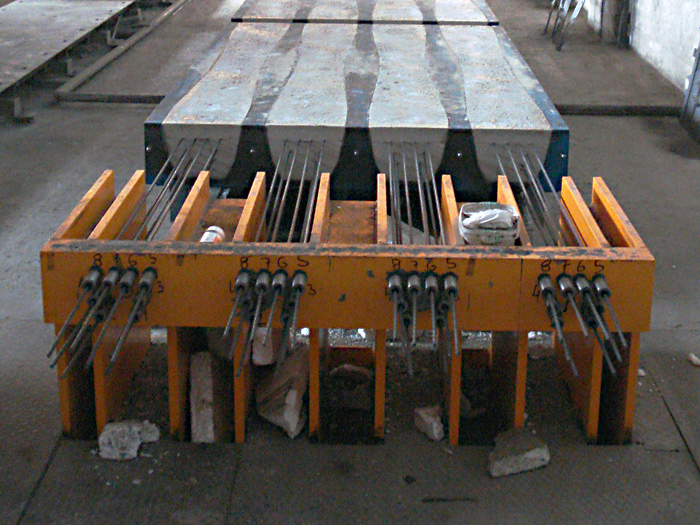Prestressed concrete is the type of concrete that has a tensioned steel inside the concrete as strands , the basic concept of this concrete is to transform the section from tension - compression section to compression -compression section .
This can be happened when the steel is tension until we reach a certain limit then we cut the steel so the force that will applied from steel to the section is compression force .
And we can reduce the stress by introducing moment from the steel by make a eccentricity from the centroid (M=P*e) and the stress will equal (stress=My/I )
The profile of the steel is called tendon and there are many shapes of it :
1- linear profile : we can called this type constant eccentricity .
2- parabolic profile : we can called this type variable eccentricity .
3- linear - parabolic profile
Method of prestressed concrete :
1- pre-tensioning : the steel is tensioned then the concrete will be cast then the steel is cut.
2- post-tensioning : the concrete is cast then the steel is tensioned and cut .
Benefits of prestressed concrete :
Allows longer span , thinner slab and fewer beams .
Lower building height.
Prevent cracking because the cracking is introducing by tension .
There are two main methods to design prestressed concrete members :
1-allowable stress method : in this method we have to check that the actual stresses is equal or less than the allowable stress .
2- load balancing method : in this method we design prestressing steel to carry a percentage of dead load .
There are many things that can be affect on the design such as :
1- type of tendon : bonded or unbonded tendon
2-type of steel : low or normal relaxation
3-the strength of concrete
In the prestressing process the total force doesn't remain constant , there is a drop in force due to losses :
1-short term losses : it is immediate losses occur during prestressed of tendons .
a-elastic shortening of concrete
b-slip at anchorage
c-friction
2-long term losses : it's time dependent losses
a-creep and shrinkage .
b-relaxation of prestressed steel .


This can be happened when the steel is tension until we reach a certain limit then we cut the steel so the force that will applied from steel to the section is compression force .
And we can reduce the stress by introducing moment from the steel by make a eccentricity from the centroid (M=P*e) and the stress will equal (stress=My/I )
The profile of the steel is called tendon and there are many shapes of it :
1- linear profile : we can called this type constant eccentricity .
2- parabolic profile : we can called this type variable eccentricity .
3- linear - parabolic profile
Method of prestressed concrete :
1- pre-tensioning : the steel is tensioned then the concrete will be cast then the steel is cut.
2- post-tensioning : the concrete is cast then the steel is tensioned and cut .
Benefits of prestressed concrete :
Allows longer span , thinner slab and fewer beams .
Lower building height.
Prevent cracking because the cracking is introducing by tension .
There are two main methods to design prestressed concrete members :
1-allowable stress method : in this method we have to check that the actual stresses is equal or less than the allowable stress .
2- load balancing method : in this method we design prestressing steel to carry a percentage of dead load .
There are many things that can be affect on the design such as :
1- type of tendon : bonded or unbonded tendon
2-type of steel : low or normal relaxation
3-the strength of concrete
In the prestressing process the total force doesn't remain constant , there is a drop in force due to losses :
1-short term losses : it is immediate losses occur during prestressed of tendons .
a-elastic shortening of concrete
b-slip at anchorage
c-friction
2-long term losses : it's time dependent losses
a-creep and shrinkage .
b-relaxation of prestressed steel .








No comments:
Post a Comment